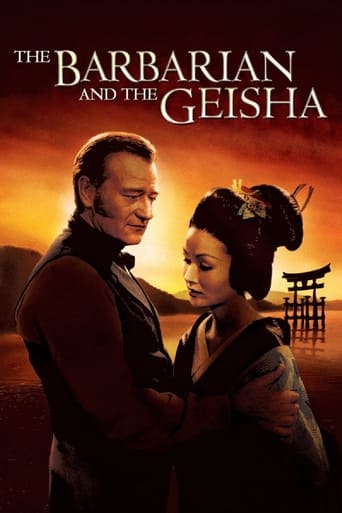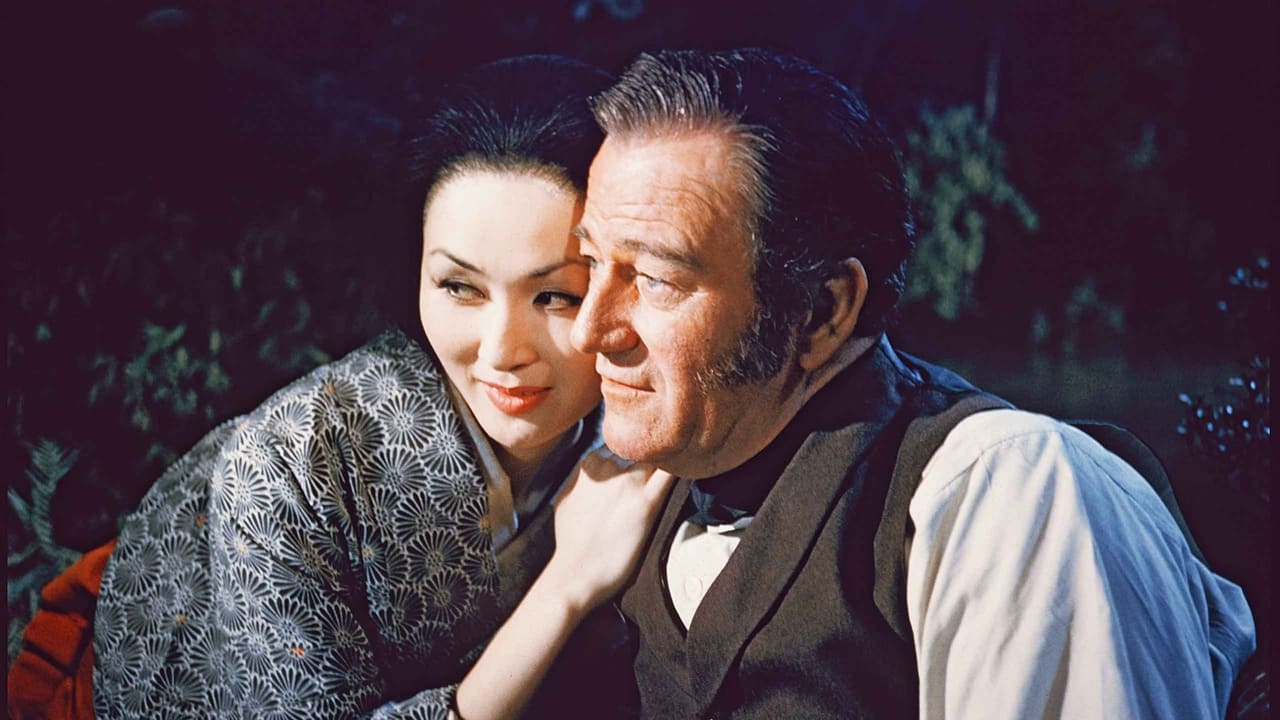JohnHowardReid
SYNOPSIS: For 200 years, Japan had been "the forbidden empire," turning away all foreigners, and abusing (and even killing) shipwrecked mariners. But in August, 1856, an American Navy frigate put into the tiny seaport of Shimoda. A longboat slowly made its way towards shore, carrying Townsend Harris (the first U.S. ambassador to Japan), his interpreter, Henry Heusken, and three Chinese servants. The city officials order Harris off, but he ignores the order and takes up residence in a ruined temple. The Japanese refuse to sell him food and keep his party under constant observation.NOTES: Fox's 114th CinemaScope movie, and the first American film to be photographed in its entirety (both indoors and outdoors) in Japan
Only film appearance of Eiki Ando
Although Fox reported a loss of only $2 million on a negative cost of $3.5 million, it's hard to believe that worldwide rentals returned as much as $2.5 million (allowing an extra million to cover print, advertising and distribution expenses). No doubt John Wayne's solid allure at the domestic box-office helped no end.COMMENT: Understandably, "The Barbarian and the Geisha" was one of the least popular of the big-budget CinemaScope movies. A preachy, reach-me-down tone is set right from the beginning, where a patronizing, off-camera commentary explains both the action and Japanese dialogue for us. At least we are spared the verbal assault of Japanese peasants speaking pidgin English, but why are there no sub-titles?As for Big John himself, he is not so much miscast as unbelievable. I feel he could have made a reasonably good fist of the role, despite the handicap of stilted and ridiculous dialogue, but he doesn't even try. What's worse, his fans are going to be mighty disappointed to find there's so little action in the picture. True, the script does occasionally ring in a bit of humor, but humor without action for the true Wayne devotee is like mustard without meat.Although often visually attractive, "The Barbarian and the Geisha" misses the pictorial richness of contemporary Japanese period films like "Gate of Hell". In fact, by Huston's high standards, the direction and camera-work could be described as comparatively unimaginative, even stodgy. You can see that a lot of money was spent. It's right up there on the screen. But the result— ponderous, slow-moving, heavy-handed, patronizingly juvenile movie will please neither Wayne's fervent admirers nor the general, entertainment-seeking picturegoer.
James Hitchcock
The hero of this film, Townsend Harris (1804-1878), was a real individual; he was an American merchant and diplomat who in 1856 was appointed the first U.S. Consul-General to Japan. The parts of the film dealing with his diplomatic mission, culminating in the signing of the "Harris Treaty" regulating American-Japanese trade, are generally based in historical fact. The parts dealing with a romance between Harris and the beautiful Japanese geisha Okichi, however, are probably fictitious, although the legend of their love has long persisted in Japan.As others have pointed out, this was (in some ways at least) an unusual role for John Wayne, although Harris does share some characteristics with the quintessential Wayne hero, such as courage, honour and patriotism. In other respects, however, as a diplomat and man of peace whose only weapon is the power of persuasion he is very different to the men of action- cowboys, gunfighters, soldiers, etc.- portrayed by Wayne in most of his other movies. The film contains two main strands. One deals with the love-story of Harris and Okichi. The other deals with the conflict between the pro- Western Japanese modernisers, who welcome Harris's mission, and the conservative, traditionalist forces who resent it. Harris is at first based not in Edo (as Tokyo was then known) but in the small coastal town of Shimoda, some sixty miles away, and the local governor Lord Tamura (a conservative sympathiser) refuses to recognise his diplomatic status. The plot of course has a number of similarities with that of "Madame Butterfly", which also concerns a young Japanese girl who falls in love with an older American man. "The Barbarian and the Geisha", however, explores the theme of cultural differences much more deeply than does Puccini's opera, which is essentially the story of a woman betrayed by a faithless lover. The forces which doom the relationship between Harris and Okichi are much more fundamental, and are rooted in irreconcilable differences between their two nations' concepts of morality and honour.Some have expressed surprise that a film celebrating the establishment of peaceful American-Japanese relations was made only thirteen years after the end of World War II, but this becomes less surprising when one considers that by 1958 Japan was a key US ally in the Cold War. Moreover, the view of the Japanese in this film is not altogether positive. The events of 1853, when Japan was forced to open its doors to the West by Commodore Matthew Perry's fleet under threat of force, are justified by allegations that the Japanese had been guilty of beheading shipwrecked foreign sailors and refusing to allow American vessels to enter their ports, even to take on emergency supplies of food and water. Arguments that it was for Japan itself, as an independent sovereign state, to determine its own trade policy with the rest of the world are largely glossed over or presented as the doctrines of a self-interested reactionary faction. Harris and the Japanese progressives are the good guys and the Japanese conservatives the bad guys, something shown when they make a treacherous attempt to murder Harris. This was John Wayne's only collaboration with director John Huston, and apparently they did not get on with one another. Yet Wayne does enough here, both as diplomat and as lover, to suggest that he had a greater range as an actor than he is normally given credit for. Eiko Ando as Okichi makes a luminously beautiful heroine. This is one film where all the Japanese characters are played by Japanese actors, something which was by no means always the rule in the fifties, "Love is a Many Splendid Thing" and "Inn of the Sixth Happiness" being two examples from the period where oriental characters were played by white actors.Huston himself was dissatisfied with the film because it was heavily re- edited by the studio and he felt that it did not reflect his vision. As far as I am aware there is no "director's cut" so we do not know what Huston's vision would have looked like had it been realised. The film we actually have, however, is far from being a bad one. It has its weaknesses; the pace tends to sag at times, especially during the first half. Nevertheless, it is visually attractive, well acted and throws an interesting light on the history of American-Japanese relations. It is an unusual film to have come out of the Hollywood of the fifties, made all the more unexpected by Huston's use of a star normally associated with films of a very different sort. 7/10
MartinHafer
In THE BARBARIAN AND THE GEISHA, John Wayne plays Townsend Harris, a real envoy from the United States who was responsible for truly opening up Japan to International relations in the late 1850s. Before him, Commodore Perry basically pushed into Japan with gunboats and forced a treaty upon the Japanese in 1853. Harris, who arrived just a bit later, worked through the details and helped ensure compliance--as many of the Japanese felt no particular inclination to honor the first treaty. All this is true and shown in the film. According to some other sources I found, the romance between Harris and a Japanese Geisha is mostly fiction and this romance is much of the focus of this film (hence, the title).My first reaction the first time I saw this movie was one of surprise. John Wayne as a diplomat?! When he's being diplomatic in most films, he says please and thank you as he pummels people!!!! So seeing him playing a man who is NOT a man of action and is able to play the diplomatic game seemed very odd indeed. In fact, I can't think of too many actors in 1958 who would have been more unusual for this role. By the way, I've seen photos of Harris and Wayne has practically no resemblance to him at all.However, despite the story taking a lot of liberties with the truth and the strange casting, the film is still very watchable. The color cinematography is nice, the film shows some nice insights into Japanese customs and culture and the acting isn't bad. All in all, a likable and watchable film despite it's odd casting.PS--Read through the trivia for this film. You find out a bit more about the real life characters as well as a supposed fight between Wayne and the director (John Huston) where Wayne apparently knocked him out!! Based on what I've read about Huston and the way he got along with actors, this is an incident I tend to believe. And, it's also a nice example of John Wayne "diplomacy".
rps-2
If I had realized John Wayne was in this movie, I would not have watched it. It's demeaning to the Japanese, unfortunate for Hollywood and embarrassing to any thinking person. But then, most John Wayne movies are like that. Hollywood in the fifties still believed that everybody in the world loved Americans when the truth was (and still is) somewhat different. The movie deals with the nineteenth century isolationism of Japan. Maybe it's Hollywood that should be isolated.To put it as succinctly as possible, this film is appalling jingoistic claptrap.(Sort of a Madama Butterfly with bad music.)



 AD
AD




